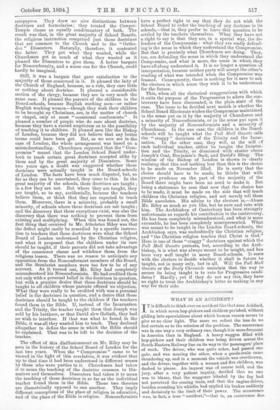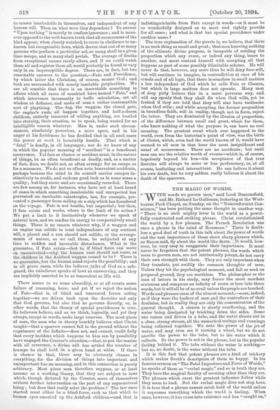WHAT IS AN ACCIDENT P TT is difficult to think
over an accident like that near Ashford, in which seven hop-pickers and children perished, without gliding into speculations about which human reason seems to give us no clear light. The more we reflect the less do we feel certain as to the solution of the problem. The occurrence was in one way a very ordinary one, though it is morefrequent in America than in England. A heavy waggon filled with hop-pickers and their children was being driven across the South-Eastern Railway line on its way to the passengers' place of work. The driver, who was quite sober, had passed one gate, and was nearing the other, when a goods-train came thundering up, and in a moment the vehicle was overthrown, and the driver, together with a woman and five children, was dashed to pieces. An inquest was of course held, and the jury, after a very patient inquiry, decided that no one was to blame, that the waggoner blinded by the fog had not perceived the coming train, and that the engine-driver, besides sounding his whistle, had applied his brakes suddenly and decisively to the limit of their power. The occurrence was, in fact, a true " accident,P—tbat is, an occurrence due to causes incalculable in themselves, and independent of any human will. Then on what were they dependent ? To answer "Upon nothing" is merely to confess ignorance ; and is more- over opposed to the well-known truth that all occurrences of the kind appear, when closely watched, to recur in obedience to un- known but recognisable laws, which decree that out of so many persons who perform a particular act, so many shall in a given time escape, and so many shall perish. The average of deaths from exceptional causes rarely alters, and if we could watch them all and register them all, would probably be found to vary only in an imperceptible degree. There are, in fact, but two reasonable answers to the question,—Fate and Providence, by which latter the Christian, of course, means God; and both are surrounded with nearly insoluble perplexities. We are all sensible that there is an inscrutable something in affairs which all races of mankind have named "Fate," and which intervenes incessantly to baffle calculation, set all wisdom at defiance, and make of man a rather contemptible sort of plaything. The fog, the waggon, the closed gate, the engine's rush, all happen together, and half-a-dozen children, entirely innocent of willing anything, are hustled into eternity, their creation, so to speak, being wasted for no intelligible reason whatever. Man is, under such circum- stances, absolutely powerless, a mere sport, and in his anger at his feebleness he has decided that in all such cases the power at work is invariably hostile. That which is " fatal" is deadly, in all languages ; nor do we know of any in which the popular meaning of " accident " is a beneficent occurrence. Yet fate or chance or accident must, in the nature of things, be as often beneficent as deadly, and, as a matter of fact, does, we doubt not, as often arrange for an escape as for a massacre. We do not so often note benevolent accidents, perhaps because the mind in its conceit carries escapes in- stinctively to credit, and reckons good luck as in some sense a quality ; but they occur and are occasionally recorded. There are few among us, for instance, who have not at least heard of cases in which something incalculable and unexpected has prevented an inevitable catastrophe, has, for example, pre- vented a passenger from sailing on a ship which has foundered on the voyage. Fate is not hostile, but impartial ; but then, if fate exists and works, where is the limit of its action P We put a limit to it instinctively whenever we speak of natural laws, and we confine its energy to comparatively small things. There is no reason whatever why, if a waggon and an engine can collide in total independence of any sentient will, a planet and a sun should not collide, or the arrange- ments of nature, as we call them, be subjected at any time to sudden and incurable disturbance. What is the guarantee, if Fate exists—that is, if blind force can move on uncontrolled—why the human race should not cease, as the children in the Ashford waggon ceased to be There is no guarantee, but the human mind rejects the possibility; and in all grave cases, while the believer talks of God as a safe- guard, the unbeliever speaks of laws as unswerving, and they are implicitly asserted to be as benevolent as His will.
There seems to us some absurdity, or at all events some failure of reasoning, here; and yet if we reject the notion of Fate—that is, of blind and uncreated forces acting together—we are driven back upon the doctrine not only that God governs, but also that he governs directly, or, in other words, that the theory of special providences is true. So believers believe, and as we think, logically, and yet they always, except in words, make large reserves. The most pious of men, the man who in theory heartily believes what Christ taught—that a sparrow cannot fall to the ground without the cognisance of the Infinite—does not, and cannot, credit fully that every incident which happens to him can by possibility have engaged the Creator's attention,—that, to put the matter with all reverence, a divine will has settled the number of tramps he shall hold in a given hand at whist. If there is chance in that, there may be obviously chance in everything, for the division of things into important and unimportant has no meaning, and in this connection is purely arbitrary. Most pious men therefore suppose, or at least assume as a working theory, that they are subject to laws which, though dictated by the Creator, move of themselves without further intervention on the part of any supernatural being ; but does that really solve the problem ? The law once started must either be a blind force, such as that which to human eyes smashed up the Ashford children—and that is indistinguis hable from Fate except in words—or it must be so wonderfully designed as to meet and rightly provide for all cases ; and what is that but special providence under another name P The tree explanation of the puzzle is, we believe, that there is no such thing as small and great ; that man knowing nothing of the ultimate divine purpose, is incapable of settling the proportion which any event, or indeed any thing, bears to another, and must content himself with accepting all that happens as part of some possibly illimitable scheme, He will never do that, however, any more than he will deny free-will, but will continue to imagine, in contradiction at once of his creeds and of all logic, that there is somehow in small matters a law independent of God which he calls Fate or Chance, but which in large matters does not operate. Many men of deep piety believe this in a most perverse way, and will say openly that they shall die when God wills, yet be fretted if they are told that they will also have toothache when God wills ; and while accepting the former proposition in boundless faith, will in reality, though not in form, reject the latter. They are dominated by the illusion of proportion, of the difference between small and great, which for them, who know nothing of what the purpose is, can have no real meaning. The greatest event which ever happened in the world, even from the historian's point of view, was the birth of Christ, which, even had the world known of it, would have seemed to all men in that hour the most insignificant and usual of occurrences. There are no accidents ; but until man can see the relative worth of events—which is, of course, hopelessly beyond his ken—his acceptance of that true doctrine will always be more or less perfunctory, or, at all events, hesitating and intermittent. He can believe it about his own death, but he very seldom really believes it about the death of the sparrows.





































 Previous page
Previous page